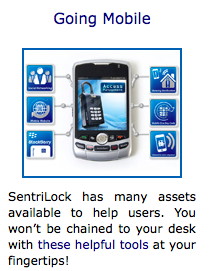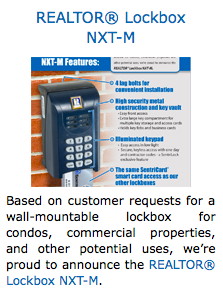Why You Need to Say 'Yes' to Multifactor Authentication
Purchasing a home is typically the largest and most significant investment of our lives. It's a milestone interwoven with personal dreams, aspirations, and an immense amount of confidential information.
Real estate agents, brokers, and their MLSs are more than just facilitators of a home purchase – you are stewards of trust, responsible for managing, protecting, and maintaining the confidentiality, integrity, and security of sensitive information on behalf of buyers and sellers.
Trust remains the core reason most people select a real estate agent. According to research from the National Association of Realtors, 97 percent of consumers said honesty and integrity were the most important traits for a real estate agent. Agents, brokers, and MLSs must ensure that their clients' personal details, financial records, and other sensitive data are kept secure and confidential.
When clients choose to work with you, they entrust you with the most personal and confidential information they will ever share in a purchase transaction. In our digital era, where anyone can access data from anywhere at any time, you must actively protect personal information.
Real estate in the crosshairs
Security company Astra reports an average of 2,200 cyberattacks per day in the U.S. across all industries, and real estate is fast becoming a preferred target. According to leading cyber security firm Octiv, bad actors were responsible for 75 real estate industry breaches last year, including well-publicized ransomware incidents that delayed some property closings for weeks, costing the industry more than $50 million. The experts at Octiv recently warned at a CoreLogic conference of MLS executives that real estate is becoming a bigger target for hackers than ever.
The problem with passwords
Security experts say the challenge for real estate is that the passwords we use to protect access to our systems and the personal information of clients on those systems are not enough. Research by NordPass documents the widespread use of poor passwords in every industry, not just real estate. However, real estate is particularly vulnerable because of the size of these transactions, the wiring of large amounts of funds, and the disclosure of buyers' and sellers' deep financial and personal details.
Multifactor authentication offers a solution
Despite efforts to strengthen password use, NordPass research shows that these efforts are a massive failure overall in the U.S.
The growing solution to our password problems is multifactor authentication. Multifactor authentication (MFA) requires users to provide two or more forms of identification to access an account. These factors can include something you know (like a password), something you have (like a smartphone), or something you are (like a fingerprint or biometric scan). MFA ensures that even if one of your credentials is compromised, unauthorized access to your account is still blocked.
By requesting multiple forms of identification, MFA makes it significantly harder for hackers to gain unauthorized access to your accounts. Requiring more than one form of identification provides vastly more robust security protection than using even a complex password.
How MFA works
Think of MFA as adding a deadbolt lock to your door – even if someone has the key (your password), they still can't get in without the second one, and that additional form of authentication is your added protection.
Common steps to an MFA process:
Step 1 – You enter your email address or mobile number.
Step 2 – You are sent a one-time link to access your account.
Step 3 – After you click on the link, you are prompted to enter a one-time numerical code (with a short expiration) sent via your account registered email or mobile number.
Step 4 – You enter the code provided and get access to your account.
Another MFA approach begins with prompting you for your username and password. Once verified, you are taken to a page requiring you to enter a one-time code, either to your registered email or mobile number associated with your account. The code has a short expiration, so you must enter that code quickly to obtain access to the account.
A little pain for a lot of gain
While MFAs are quickly becoming standardized in real estate, this has not been without resistance. MLSs and brokerages don't like the idea of "forcing" their users to change. Change is hard, especially when the behavior you are trying to change is among independent private contractors.
Overall, many agents don't like the idea that they might have to take extra steps to log in and would rather use a password. Again, the problem tech companies face is that password strength is abysmal overall. In fact, the Nordpass study found that "123456" and "password" are still among the most commonly used passwords in America.
Our weak password culture is a ticking time bomb, waiting to be exploited by hackers. Multifactor authentication creates a layer of security that solves the password problem by requiring additional forms of identification, making it exponentially harder for unauthorized users to gain access.
MFA is your digital bodyguard
Yes, multifactor authentication may occasionally require a little more work to access your accounts, but its extra protection is more than worth it. Consider the potential consequences of a security breach: lost client trust, financial losses, and damage to your professional reputation. Verifying your identity takes only a few extra seconds. Think of it as an investment in the long-term security of your business.
Imagine this scenario: A hacker gains access to your email account and starts sending fraudulent messages to your clients, requesting sensitive information or funds. The damage to your reputation and client relationships could be irreparable. Now, consider the same scenario with MFA enabled. Even if the hacker obtains your password, they won't be able to access your account without the second form of authentication, effectively stopping the attack in its tracks.
The minor inconvenience of an extra login step – or two – pales in comparison to the potential consequences of a breach.
Artificial intelligence is improving MFA
One valuable and practical benefit of artificial intelligence is that it is making the MFA process less frequent. Known as "adaptive authentication," it uses built-in AI and machine learning to selectively decide and deploy MFA only when it determines it is required.
CoreLogic recently rolled out adaptive authentication as part of its Clareity security offering to deter unauthorized users, bots, and deceptive login attempts in real time. By learning your behavior patterns, it can instantly spot potentially nefarious activity.
For example, if you normally log in from Miami but MFA sees you are attempting to log in from Moscow, it will deploy MFA. Otherwise, when it recognizes you accessing your Single Sign-On dashboard from the same place, you will be able to sign in without additional authentication.
Better to be safe than sorry
Cyber threats are becoming increasingly sophisticated in the real estate industry. Embracing multifactor authentication is no longer a choice but a necessity.
Keep in mind that whenever you struggle to use any new technology, Tech Helpline analysts can help. This service is available to over 750,000 Realtors in North America as a member benefit from their MLS or association.
Saying "yes" when asked to opt into MFA helps uphold the trust your clients place in you, safeguarding the very foundation of your business – and our industry.
Related reads
From the Tech Helpline Blog:
4 Ways to Improve Your Cybersecurity
6 Reasons Not To Use Similar Passwords And The Best Alternatives
Is Your Computer Protected from All The Newest Cyber Threats? A Quick Checklist
Tricia Stamper is Director of Technology at Florida Realtors®, which owns both Tech Helpline and Form
MORE >
You are viewing our site as a Broker, Switch Your View:
Agent | Broker Reset Filters to Default Back to ListSentriLock’s REALTOR® Lockbox NXT

Lockbox NXT SystemWelcome to the SentriLock Resource Library. We know you want to make an informed decision about lockbox systems and have provided these resources for you to utilize in the evaluation process. In addition, please click HERE to contact a member of the REALTOR® Alliances Team to arrange for a customized presentation and pricing proposal tailored to your requirements. |
 |
 |
 |
 |
 |
 |
 |
Related Articles
[Podcast] Navigating Realtor Safety: Insights with Shannon Cutler
In this episode of Million Dollar Question, host Billy Ekofo chats with Shannon Cutler, an expert deeply committed to Realtor safety. With seasoned experience and hands-on knowledge, Shannon enlightens us about the importance of ensuring safety in the real estate profession. She delves into practical strategies and simple tips for prioritizing while navigating the intricate realm of real estate dealings.
In this episode of Million Dollar Question:
What prompted Shannon's transition from police officer to Realtor
Property market dynamics on Vancouver Island
Tactics for safe real estate practices
Misconceptions around safety in the real estate industry
Potential pitfalls of hurrying through deals and how to avoid them
Connect with Shannon:
LinkedIn: Shannon Cutler
Website: shannoncutler.com
Instagram: @islandshannoncutler
Listen to this podcast on:
Spotify
Apple Podcasts
RadioPublic
Visit the episode homepage for show notes and more
MORE >
Third-Party Cookies Do Crumble With Google Chrome's Privacy Shift
For years, third-party cookies have been the bread and butter of online advertising. The practice allows you, the marketer, to target website visitors with laser precision based on their browsing history.
However, the winds of change are blowing through the digital landscape, and Google Chrome, the world's dominant browser, is leading the charge toward a privacy-first future. Its plan? To phase out third-party cookies entirely by the end of 2024.
Note: As of October 2023, Google Chrome has the highest browser share in the United States at 51.94%. Safari at 29.29%, Edge at 8.67%, and Opera at 4.4%.
So, how exactly is Google accomplishing this cookie crackdown? Buckle up real estate marketers, because it's about to get technical!
The Chrome Blockade
Anthony Chaves, who is the VP of Privacy Sandbox at Google, announced in his article titled "The next step toward phasing out third-party cookies in Chrome" that,
… January 4, we'll begin testing Tracking Protection, a new feature that limits cross-site tracking by restricting website access to third-party cookies by default. We'll roll this out to 1% of Chrome users globally, a key milestone in our Privacy Sandbox initiative to phase out third-party cookies for everyone in the second half of 2024, subject to addressing any remaining competition concerns from the UK's Competition and Markets Authority.
Tracking Protection
Currently in its testing phase, this feature restricts third-party cookies by default for a small percentage of Chrome users. As the rollout expands, websites' ability to track users across different domains will be severely limited.
Privacy Sandbox
This umbrella term encompasses Google's alternative solutions for targeted advertising and user measurement without relying on third-party cookies. These solutions are still under development by Google and the broader web community.
Some proposed technologies include:
Topics API – This assigns users broad interest categories like "sports" or "travel" based on their browsing activity, instead of specific website visits.
Federated Learning of Cohorts (FLoC) – Cohorts are groups of users with similar browsing habits, and ads are targeted to these groups without revealing individual data.
Trust Tokens – Websites issue encrypted tokens to users as proof of identity, reducing the need for third-party tracking.
Key Insights for Real Estate Marketers
The blocking of third-party cookies presents both challenges and opportunities for real estate marketing. Here are five crucial insights to navigate the changing landscape:
Embrace First-Party Data by cultivating a robust first-party data strategy through website analytics, CRM integrations, and loyalty programs. Leverage this data for personalized marketing campaigns and audience segmentation, all within the bounds of user privacy.
Contextual targeting takes center stage through continuous investment into contextual targeting platforms that rely on website content and user behavior signals rather than cookies. This allows you to deliver relevant ads based on the current browsing context. This would be like showcasing luxury listings on real estate search pages.
Build trust and direct relationships with potential buyers and sellers. Use email marketing, social media engagement, and targeted content marketing to curate leads and convert them into loyal clients.
With mobile dominating real estate searches, it's crucial to optimize your website and marketing efforts for mobile-first. It's surprising to see many people still focusing on desktop view when designing and messaging their advertising assets. Make sure you prioritize mobile to stay ahead in the game. Consider location-based targeting to reach users actively searching for properties in specific areas.
Experiment with Privacy Sandbox Solutions by staying informed about the evolving Privacy Sandbox initiatives and experimenting with the available APIs and tools. Early adoption can give you a head start in the new privacy-focused advertising landscape.
What are the key differences between third-party cookies and first-party cookies?
The key difference between third-party cookies and first-party cookies lies in who creates and uses them.
First-party cookies
Created by the website you're visiting (the "first party").
Stored on your device by the website's domain.
Used by the website to remember your preferences, keep you logged in, track your activity on the site, and personalize your experience.
Generally considered less intrusive because they don't share data with other websites.
Third-party cookies
Created by a domain other than the website you're visiting (the "third party").
Often placed on your device by embedded code from advertising or analytics companies.
Can follow you across different websites that use the same third-party code, building a detailed profile of your browsing habits.
Used for targeted advertising, retargeting, and cross-site analytics.
Raise more privacy concerns because they can track your activity across multiple domains without your explicit knowledge.
Summary
While Google's third-party cookie phaseout may seem daunting, it also presents an opportunity for real estate marketers to refine their strategies and prioritize user privacy. Embrace first-party data, invest in contextual targeting, and build direct relationships to thrive in the privacy-first future. Remember, the focus is shifting from intrusive tracking to building trust and delivering value. Embrace this change, and unlock the potential of a more sustainable and ethical approach to real estate marketing.
This article is designed to be informative and actionable, but it's important to stay updated on the latest developments in Google's Privacy Sandbox and adapt your strategies accordingly. Don't hesitate to seek further resources and guidance from qualified SEO and marketing professionals or contact David Gumpper of the WAV Group.
To view the original article, visit the WAV Group
MORE >









